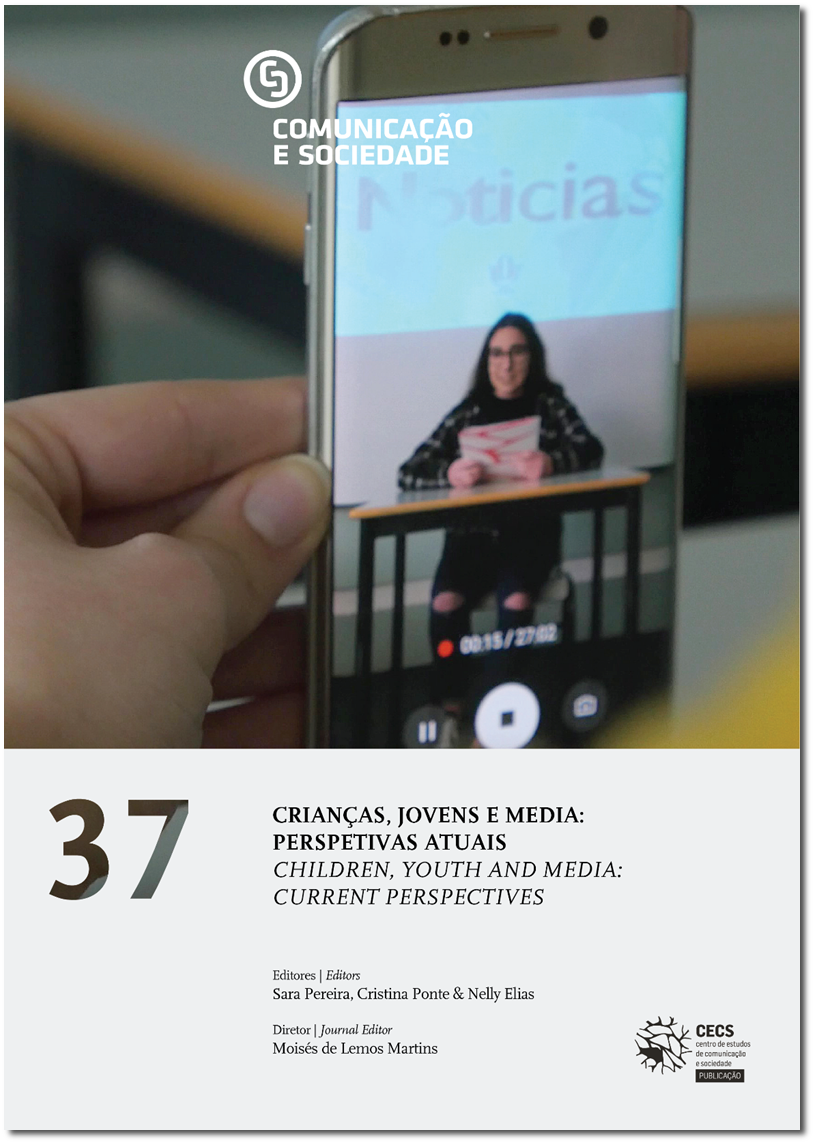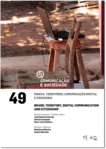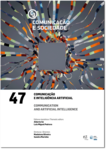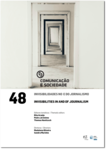Crianças, jovens e media: perspetivas atuais
DOI:
https://doi.org/10.17231/comsoc.37(2020).2687Resumo
A investigação sobre crianças, jovens e media registou, nas últimas duas décadas, um avanço considerável no que diz respeito ao número de estudos produzidos, aos temas abordados e às metodologias utilizadas. Esta área, por natureza multidisciplinar, foi-se afirmando no campo das Ciências da Comunicação, marcando a agenda científica e abrindo o debate público sobre o impacto dos media na vida das crianças e dos jovens e o modo como usam, compreendem, se apropriam e produzem conteúdos mediáticos. A era digital trouxe novos meios e plataformas, gerou uma maior diversidade de conteúdos e suscitou diferentes modos de acesso e diferentes práticas de consumo e de comunicação por parte deste público. Uma realidade que trouxe outros desafios à investigação, fornecendo novos tópicos e pistas para estudar o mundo mediático e a sua ação nas identidades e nas culturas infantis e juvenis...Downloads
Referências
Buckingham, D. (2006, março) Media Education in the age of digital technology. Comunicação apresentada no 10.º aniversário do MED Congress “La sapienza di comunicare”, Roma.
Chiong, C. & Shuler, C. (2010). Learning: is there an app for that? Investigations of young children’s usage and learning with mobile devices and apps. Nova Iorque: The Joan Ganz Cooney.
Holloway, D., Green, L. & Love, C. (2014). ‘It’s all about the apps’: parental mediation of preschoolers’ digital lives. Media International Australia, Incorporating Culture & Policy, 153, 148-156.
Kabali, H.K., Irigoyen, M. M., Nunez-Davis, R., Budacki, G. J., Mohanty, H. S., Leister, P. K. & Bonner, L. R. (2015). Exposure and use of mobile media devices by young children. Pediatrics, 136(6), 1044-1050.
Krotz, F. (2007). The meta-process of “mediatization” as a conceptual frame. Global Media and Communication, 3(3), 256-260.
Lemish, D. (2020, 02 de abril). TV, video games and other media could actually help your children while we’re all staying at home. NJ.com. Retirado de https://www.nj.com/opinion/2020/04/tv-video-games-and-other-media-could-actually-help-your-children-while-were-all-staying-at-home-opinion.html
Lemish, D. (2015). Children and media: a global perspective. Malden, MA: Wiley-Blackwell.
Li, B. & Shin, W. (2017). Parental mediation of children’s digital technology use in Singapore. Journal of Children and Media, 11, 1-19.
Livingstone, S. (2020, 13 de maio). Digital by default: the new normal of family life under COVID-19. [Post em blogue]. Retirado de https://blogs.lse.ac.uk/parenting4digitalfuture/2020/05/13/digital-by-default/
Muis, K. R., Ranellucci, J., Trevors, G. & Duffy, M. C. (2015). The effects of technology- mediated immediate feedback on kindergarten students’ attitudes, emotions, engagement and learning outcomes during literacy skills development. Learning and Instruction, 38, 1-13.
Nathanson, A. (1999). Identifying and explaining the relationship between parental mediation and children’s aggression. Communication Research, 26(6), 124–143.
Neumann, M. M. (2014). An examination of touch screen tablets and emergent literacy in Australian pre-school children. Australian Journal of Education, 58(2), 109-122.
Nikken, P. & Jansz, J. (2014). Developing scales to measure parental mediation of young children’s internet use. Learning, Media, and Technology, 39, 250-266.
Nikken, P. & Schols, M. (2015). How and why parents guide the media use of young children. Journal of Child and Family Studies, 24(11), 3423–3435.
Paus-Hasebrink, I., Kulterer, J. & Sinner, P. (2019) Social inequality, childhood and the media. A longitudinal study of the mediatization of socialisation. Suiça: Palgrave MacMillan. https://doi.org/10.1007/978-3-030-02653-0
Pereira, S. (1999). A televisão na família – processos de mediação com crianças em idade pré-escolar. Braga: CESC/IEC. Retirado de http://hdl.handle.net/1822/4265
Pereira, S., Fillol, J. & Moura, P. (2019). Young people learning from digital media outside of school: the informal meets the formal. Comunicar, 58, 41-50. https://doi.org/10.3916/C58-2019-04
Ponte, C., Pereira, S. & Castro, T.S. (2019). Parenting young children in changing media environments with twenty years apart. Communicazioni Sociali, 2, 276-288. https://doi.org/10.26350/001200_000064
Radesky, J. S., Schumacher, J. & Zuckerman, B. (2015). Mobile and interactive media use by young children: the good, the bad, and the unknown. Pediatrics, 135(1), 1-3.
Schofield-Clark, L. (2011). Parental mediation theory for the digital age. Communication Theory, 21, 323-343.
Troseth, G. L., Russo, C. E. & Strouse, G. A. (2016). What’s next for research on young children’s interactive media? Journal of Children and Media, 10(1), 54-62.
Valkenburg, P. M., Krcmar, M., Peeters, A. L. & Marseille, N. M. (1999). Developing a scale to assess three styles of television mediation: instructive mediation, restrictive mediation, and social coviewing. Journal of Broadcasting and Electronic Media, 43(1), 52–67.
Wartella, E., Rideout, V., Lauricella, A. & Connell, S. (2013). Parenting in the age of digital technology: a national survey. Illinois: Center on Media and Human Development School of Communication Northwestern University. Retirado de http://static1.1.sqspcdn.com/static/f/1083077/22839022/1370380073813/PARENTING_IN_THE_AGE_OF_DIGITAL_TECHNOLOGY.pdf?token=ywpuHSykX7ykiNpr4IvemQ%2BPlX4%3D
Downloads
Publicado
Como Citar
Edição
Secção
Licença
Os autores são titulares dos direitos de autor, concedendo à revista o direito de primeira publicação. O trabalho é licenciado com uma Licença Creative Commons - Atribuição 4.0 Internacional.











